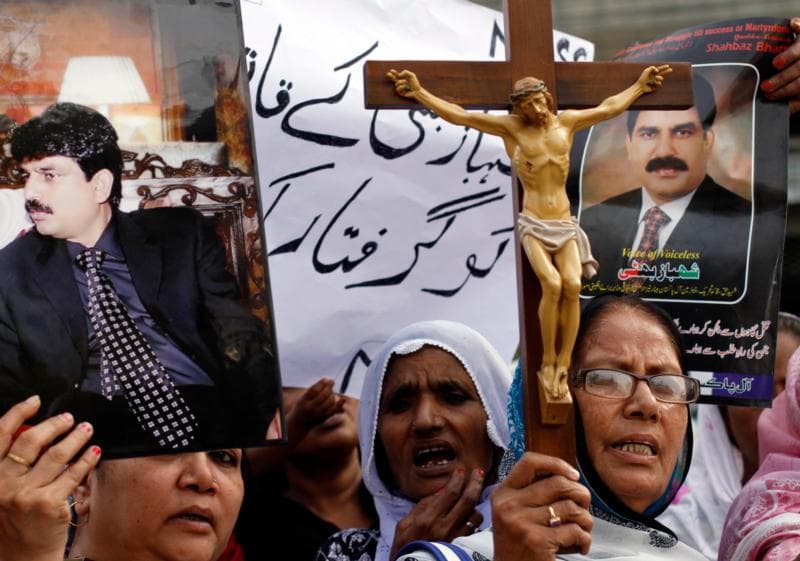ROME – Few people outside Pakistan probably remember where they were or what they were doing on March 2, 2011. Yet for religious minorities in that pivotal Islamic nation, it was a historically sad day: Shahbaz Bhatti, a Catholic layman and first Federal Minister for Minority Affairs, was murdered when his car was riddled with 27 bullets.
In a video recorded shortly before his death, he said: “I know Jesus Christ who sacrificed his life for others. I understand well the meaning of the cross. I am ready to give my life for my people.”
Since Bhatti died not only because of his Catholic faith but his fight for all religious minorities, including Muslims, his younger brother Paul, a family doctor who has his practice in Italy but who’s often in and out of Pakistan, would like to see March 2 declared as an international day of “basic human rights,” starting with the right to profess any faith or none at all.
“Professing one’s faith is a basic human right,” Paul Bhatti told Crux on Thursday, echoing his martyred brother. “It’s a human right to believe [in God] or not. No one should be killed for having a different faith or no faith at all.”
The younger Bhatti is the former federal Minister of National Harmony and Minority Affairs of Pakistan, giving him first-hand experience of what’s actually feasible when it comes to minorities such as Christians, who often see their lives threatened and who on a daily basis are treated as second-class members of society.
Christians make up one of the two largest non-Muslim religious minorities in Pakistan, along with Hindus. As of 2005, Christians were estimated to be 2.5 million, representing 1.5 percent of the total population.
Religious minorities often don’t have access to good jobs, are not allowed to own businesses or attend the best schools. In addition, the country’s blasphemy law means that anyone can be accused of saying something offensive to Allah or the Quran and sent to jail, even sentenced to the death penalty.
The blasphemy law
According to Bhatti, simply overturning the blasphemy law is not enough: “Many are killed by a mob after they’re declared innocent, and others are stoned even before charges are officially pressed.”
“We have to change the strategy, get more involved in the government, yes, but also promote dialogue among religious leaders, make it clear that we don’t want to hurt any religious minorities but instead honor all the human values and the value of all human lives,” he said.
In Pakistan, according to Bhatti, people are discriminated against on the basis of many factors, not only religion.
Christians face pressure because of their social status, but also because Christianity often represents Western culture hated by many in Pakistan, “especially the radicals, even though many of them have family members studying in the United States or England.”
Another reason Christians are discriminated against is the attention they sometimes draw from the international community. A case in point is Asia Bibi, the Christian woman who spent almost a decade on death row for allegedly insulting Allah and was finally acquitted and allowed to leave Pakistan this year.
“Anyone in their right mind knew that she was not subjected to any due diligence,” Bhatti said of Bibi. “She was so helpless, so poor, that the international community immediately came to her aid, to protect her. And for a lot of people, this was a tool to then justify their extremism.”
After being released from prison, Bibi had to go into hiding out of fear for her life and was eventually granted asylum in Canada. According to various reports, she requested asylum in the United Kingdom, but the government demurred due to fears of a violent uprising among the large Pakistani community living in England.
RELATED: Italy open to asylum for Asia Bibi, UK reportedly demurs
Despite the fragile situation, Bhatti believes strongly that Christians “are not the only ones suffering due to the blasphemy legislation.”
“What we need at this moment is a proposal that can unite Pakistan, that can solve the basic problem that leads to extremism and terrorism: lack of unity,” he said. “If there’s peace in Pakistan, even poor people or those who are marginalized will benefit. I think the government is helpless, because it’s very weak.”
“There’s no control,” Bhatti said. “In Pakistan, not only Christians, but anybody, can accuse someone else of anything, and kill him. Somebody can say that a person stole something and it doesn’t matter if the accused is Christian or Muslim, the accuser can still kill that person. Because there’s no law and no one to properly enforce it if there is.”
In general, he said, most Pakistanis are not “anti-Christian,” despite the extremism and violence.
“They are divided societies, with many terrorists and full of violence, yes. But the problem is that there’s no value for the human person. And in these scenarios, any minority, by general rule, is in danger,” Bhatti argued.
On his brother’s martyrdom
Though conscious of the fact that there’s a church process to declare his brother a martyr, meaning someone who was killed in hatred of the faith, Paul believes that Shahbaz should be recognized as such now.
Paul took care of cleaning the spartan apartment of his older brother after his death, and as he’s recalled in the past, there were only three items in the small bedside table: a Bible, a rosary and a picture of the Virgin Mary.
Many, including in the Catholic Church’s hierarchy, are afraid of the repercussions even opening the process to declare Bhatti a martyr could have on Christians in Pakistan. However, his brother isn’t worried.
“I think many Muslims believe he was a martyr, as do many politicians,” the younger Bhatti said. “I don’t see any problems in Pakistan as a direct consequence. My brother was becoming powerful, people were answering to him, his faith was changing Pakistani laws and hearts. This was enough to worry the extremists.”
“But [the Church] recognizing him as a martyr would be a good thing, especially for the young people of Pakistan,” he said.
Follow Inés San Martín on Twitter: @inesanma
Crux is dedicated to smart, wired and independent reporting on the Vatican and worldwide Catholic Church. That kind of reporting doesn’t come cheap, and we need your support. You can help Crux by giving a small amount monthly, or with a onetime gift. Please remember, Crux is a for-profit organization, so contributions are not tax-deductible.















